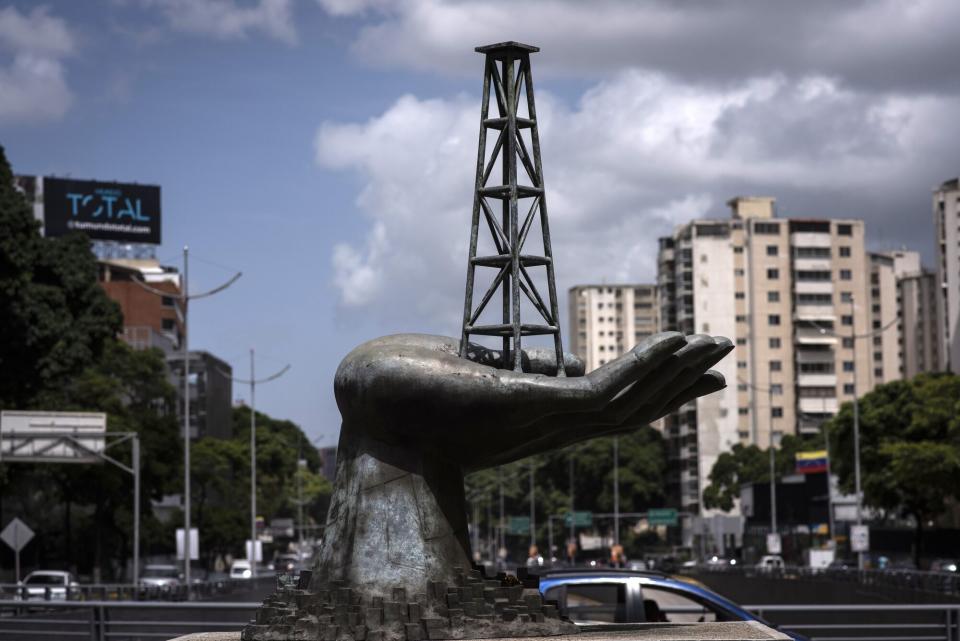Lottery-Like Bet on Venezuela Pays Off for Hedge Funds
(Bloomberg) -- Lee Robinson started loading up on Venezuela debt just as most investors were fleeing.
Most Read from Bloomberg
Biggest Cross-Asset Rally This Year Takes Wall Street by Storm
Iceland’s Blue Lagoon on Alert for Magma Flows After Earthquakes
Israel’s Fight With Iran Proxies in Syria Poisons Russia Ties
The defaulted sovereign and state oil company bonds were trading for less than a dime, and there was no end in sight to Trump-era sanctions on the country.
But for Robinson, founder of the London-based hedge fund Altana Wealth, it was a no-brainer. The sovereign debt was never going to zero, he reckoned. So in the last three years, he kept adding the notes to his Credit Opportunities Fund, which has topped $100 million now, he said.
Today, Robinson and a handful of other investors who took a lottery-like bet on the debt are counting their wins. Washington lifted some economic sanctions on the country last month, unleashing a bond rally that sent notes that were trading for as little as 2 cents to 13 cents.
“It could have been a loss-making trade,” he said in an interview. “But it could go up five to 10 times. It wasn’t a hard sell.”
Robinson’s returns jumped more than 60% from the fund’s 2020 inception. Others that bought or held the bonds, including funds managed by Mangart Capital Advisors, WinterBrook Capital, Copernico Capital Partners, Canaima Capital Management and emerging-market investor Ashmore Group Plc, all tallied double-digit gains, according to fund managers and data compiled by Bloomberg.
Representatives for Ashmore and Copernico didn’t reply to a request for comment, while Mangart’s representative declined to comment. Celestino Amore, a member of the investment advisory committee for Canaima, said the fund has doubled in value since last month’s lift of the trading ban.
Venezuela’s $60 billion of government and Petroleos de Venezuela SA bonds have been in default for six years and trade at deeply distressed levels. Few see President Nicolas Maduro’s government restructuring the debt any time soon. But the rally has provided a rare bit of relief for investors who stuck with the trade in a market that was once left for dead.
The market came to life last month when the Biden administration eased sanctions on Venezuela’s oil, gas and gold to entice Maduro to hold free and open presidential elections next year. The package included removal of a secondary trading ban on the debt, which effectively allowed US investors to buy the bonds for the first time in four years.
Prices for some of the bonds doubled overnight as US hedge funds rushed to buy.
“Before the lifting of the trading ban, we spoke with two, three clients about Venezuela. Now, we talk to as many as 20,” said Francesco Marani, head of trading at Madrid-based boutique investment firm Auriga Global Investors. He says he’s traded more Venezuela bonds in the past two weeks than in the first nine months of the year.
Analysts at Wall Street banks published rare notes on the outlook for the debt in a sign of the growing interest, with Citigroup Inc. estimating 40% losses for bondholders in an eventual restructuring and Bank of America Corp. upgrading PDVSA notes.
Index Decision
After an initial surge, the rally has cooled in recent days. Now, investors are awaiting JPMorgan Chase & Co.’s decision on how it will treat the bonds in its widely followed emerging market indexes. The bank said on Wednesday that it put about $53 billion worth of sovereign and PDVSA bonds on an index watch for JPMorgan’s EMBI index series until Jan. 31.
The bank had cut the weight of those notes to zero in its indexes back in 2019 following the sanctions. Raising their weight would add an estimated $1.5 billion at market value to the current demand, according to estimates from Morgan Stanley.
Read more: Venezuela, PDVSA Bonds Put on Watch for Key JPMorgan Indexes
For Edward Cowen, CEO at London-based asset manager WinterBrook Capital, Venezuela is shaping up to be a once-in-a-decade type of trade. “This decade we think it’s going to be Venezuela,” he said.
With a partner, WinterBrook launched a Venezuela-dedicated fund in March 2022, when sovereign bonds were trading around 10 cents on the dollar. Now they’re around 19. It now holds nearly $75 million of bonds at market value.
London-based Ashmore, which holds around 40% of the $1.7 billion of PDVSA bonds due in 2020, increased its position the first half of the year in at least one of their emerging market sovereign debt funds, doubling their holdings since 2018, according to data from filings compiled by Bloomberg.
“The winners are anyone who either put a specific Venezuela fund or was able to buy at the lowest levels,” said Hans Humes, head of Greylock Capital Management, a longtime holder of the debt and member of a committee of creditors. “Prices have been artificially pushed to low ends and below any reasonable recovery values.”
(Updates fund holdings starting in paragraph 16)
Most Read from Bloomberg Businessweek
These Five Countries Are Key Economic ‘Connectors’ in a Fragmenting World
Online Gambling Has Millions of Young Africans Battling Addiction
Shipping Startup Flexport Is in Crisis Mode Heading Into the Holiday Season
©2023 Bloomberg L.P.




